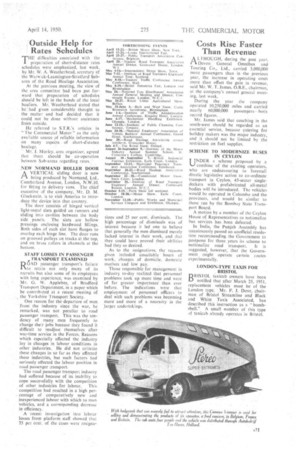Outside Help for Rates Schedules
Page 33

If you've noticed an error in this article please click here to report it so we can fix it.
THE difficulties associated with the preparation of short-distance rates schedules were emphasized, last week, by Mr. W. A. Weatherhead, secretary of the Warwick-Leamington-Stratford Subarea of the Road Haulage Association.
At the previous meeting, the view of the area committee had been put forward that preparation of schedules should be left in the hands of the local hauliers. Mr. Weatherhead stated that be had given considerable thought to the matter and had decided that it could not be done without assistance from outside.
He referred to S.T.R.'s articles. in "The Commercial Motor" as the only available source of reliable information on many aspects of short-distance haulage,
Mr. J. Morley, area organizer, agreed that there should be co-operation between Sub-areas regarding rates.
NEW NORMAND ROLLER DOOR
AVERTICAL sliding door is now being produced by Normand, Ltd., Cumberland Avenue, London, N.W.10, for fitting to delivery vans. The chief executive of the company, Mr. D. M. Gluckstein, is to visit America to introduce the device into that country.
The door consists of hinged vertical light-metal slats guided on runners and sliding into cavities between the body side Panels. The slats are hollow pressings enclosing hardwood fillings. Both sides of each slat have flanges to overlap each hinge line. The door runs on grooved pulleys on tracks at the top, and on brass rollers in channels at the bottom.
STAFF LOSSES IN PASSENGER TRANSPORT EXAMINED
D OAD passenger transport's failure JA-to retails not only many of its recruits but also some of its employees with long experience, was examined by Mr, G. W. Applebee, of Bradford Transport Department, in a paper which he contributed at a recent meeting of the Yorkshire Transport Society.
One reason for the departure of men from' the industry since the war, he remarked, was not peculiar to road passenger transport. This was the tendency of many men frequently to change their jobs because they found it difficult to readjust themselves after war-time service in the Forces. Reasons which especially affected the industry lay in changes in labour conditions in other industries. He did not criticize these changes in so far as they affected these industries, but such factors had seriously affected the labour position in road passenger transport.
The road passenger transport industry had suffered because of its inability to cope successfully with the competition of other industries for labour. This competition had resulted in a high percentage of comparatively new and inexperienced labour with which to now vehicles, and a corresponding decrease in efficiency.
A recent investigation into labour losses from platform staff showed that 75 per eetit. of the cases were resigna tions and 25 per cent. dismissals. The high percentage of dismissals was of interest because it led one to believe that generally the men dismissed merely lacked interest' in their work, and that they could have proved their abilities had they so desired.
As to the resignations, the reasons given included unsuitable hour's of work, changes of domicile, domestic motives and low pay.
Those responsible for management in industry to-day realized that personnel problems took up more time and were of far greater importance than ever before. The indications were that employment of personnel officers to deal with such problems was becoming more and More of a necessity in the larger undertakings.




























































































